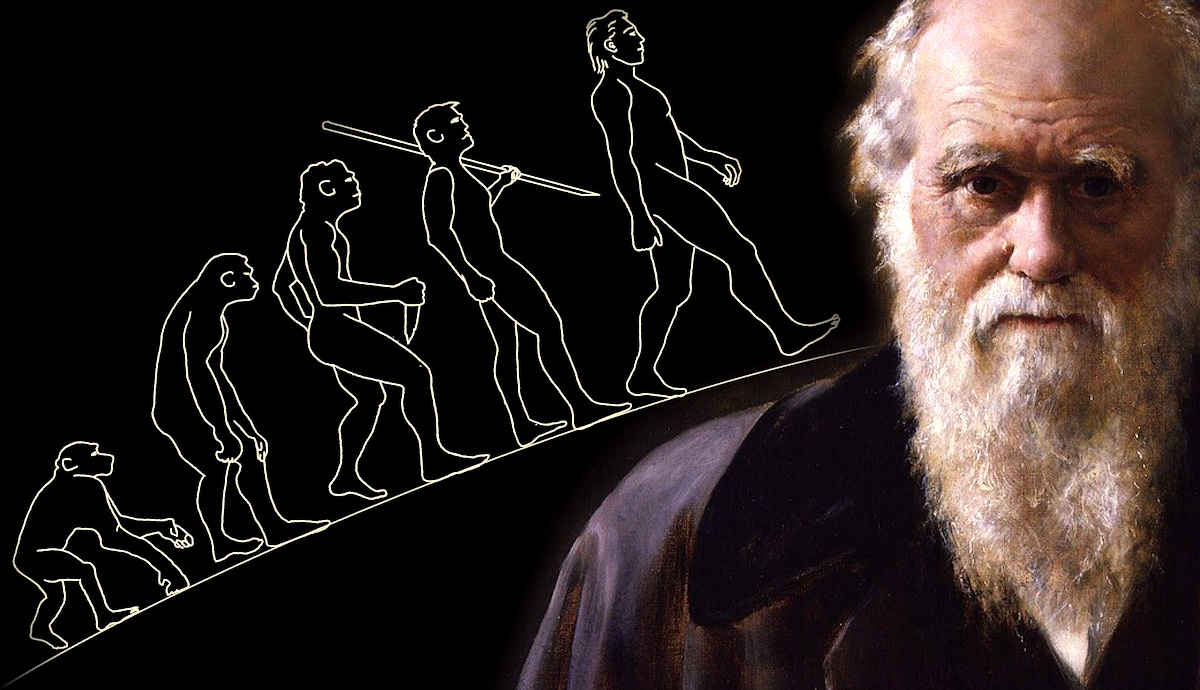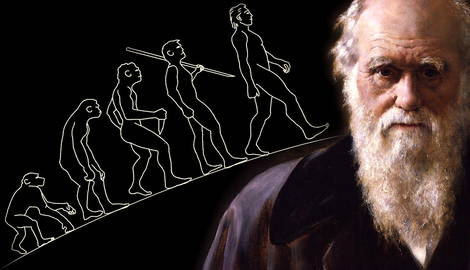
If one of the purposes of philosophy is to metabolize the conclusions of other fields of inquiry, then it is natural to assume that one of the most enduring developments in the natural sciences – the rise of Darwinism as the accepted basis for understanding life on earth – would have philosophical consequences. However, as this article hopes to demonstrate, the philosophical legacy of Darwin’s theory is enormously diverse and complicated.
This article begins by summarizing Darwin’s theory of evolution. It then discusses Darwin’s philosophical influences and explains how certain philosophical commitments shaped Darwin’s scientific project from the outset. It then moves on to discuss the two main forms of influence Darwin’s work has exerted over philosophy since: the effect on analytic philosophy of science, and the effect on late 19th century continental thought – especially that of Henri Bergson.
Charles Darwin’s Theory of Evolution

It would be helpful to begin with a brief summary of Charles Darwin’s theory of evolution and natural selection. His work is ordinarily characterized as having argued for three central theses: that variation occurred randomly among members of a species; that an individual’s traits could be inherited by its progeny; and that the struggle for existence would allow those with more favorable traits to survive more often than those with less favorable ones.
His work was largely substantiated by observations he made during the voyage he undertook around the world during his twenties. Whilst on the H.M.S Beagle, the ship which carried him, he also read certain speculative or philosophical works in detail, which proved to have an extensive effect both on the development of his theory and on the manner in which he presented it; that is, those question which it is intended as an answer to.
Darwin is most often described as a scientist, a naturalist or a biologist before he is described as a philosopher. Indeed, whether or not he would have viewed himself as a philosopher is far from clear. What isn’t in dispute is that he was greatly influenced by the philosophical currents of his time, which went a long way towards shaping the aims and methodological restrictions of his work.
John Herschel’s Influence

Darwin’s main philosophical influence was John Herschel. Herschel’s interests were wide ranging, but he made two primary contributions to Darwin’s thought. First, he characterized the problem facing naturalists in the terms which Darwin took them up – i.e., the problem of how to explain the emergence of various species over time. Second, he laid some of the groundwork to a more general kind of evolutionary thought, with implications which went further even than Darwin’s field.
Consider, for instance, Herschel on the evolution of language:
“Words are to the Anthropologist what rolled pebbles are to the Geologist – battered relics of past ages often containing within them indelible records capable of intelligent interpretation – and when we see what amount of change 2000 years has been able to produce in the languages of Greece & Italy or 1000 in those of Germany France & Spain we naturally begin to ask how long a period must have lapsed since the Chinese, the Hebrew, the Delaware & the Malesass [Malagasy] had a point in common with the German & Italian & each other.”
Christian Dogma and Time

The answer to the question, as Herschel himself offers, is only this:
“Time! Time! Time! – we must not impugn the Scripture Chronology, but we must interpret it in accordance with whatever shall appear on fair enquiry to be the truth for there cannot be two truths. And really there is scope enough: for the lives of the Patriarchs may as reasonably be extended to 5000 or 50000 years apiece as the days of Creation to as many thousand millions of years”.
Underlying Herschel’s work there seems to be a kind of ethos, or way of thinking, which constitutes a reaction against a certain kind of Christian dogma. That dogma is one which Darwin himself was to run up against, one which attempts to limit the boundaries of change one can tolerate within a Christian framework in light of the perfection of creation.
If that seems a little abstract, let us put the general problem this way: if God is perfect and made a perfect world, as most Christians hold, then why the need for such dramatic changes? In many ways, the problem of biblical chronology which Herschel appears to be wrestling with in his work on language constitutes something of a skirmish in a much wider conflict over time and change in the context of Christianity.
The Effect of Charles Darwin’s Theory of Evolution

Darwin is, therefore, responding to a philosophical provocation. Like most significant philosophical problems, it is not merely academic, but reflects some of what is going on in more popular discourses. The philosophical significance of Darwin’s own work reflects that principle.
The effect of Darwin’s work on the popular imagination was profound. We can provisionally group the philosophical effect of Darwin’s work into two camps. First, there is the direct effect it has had on those philosophers concerned especially with the study of science itself. Darwinism continues to be a matter of major philosophical controversy. Analytic philosophers of science are still greatly divided on whether certain major tenets of Darwinism have proven to be true – in particular, the first Darwinian thesis that variation is a random occurrence. Further questions raised by philosophers of science constitute challenges to Darwin as such, than a concern with the conceptual content of terms like ‘random’, ‘species’ and such.

The second kind of effect Darwin’s work had on philosophy was an introduction of a newfound awareness of two new tenets: first, the significance of the evolutionary processes for making sense of the world; and secondly, the way in which the progression of life in itself structures human life and the world around us.
It should be stressed that this is not as direct an effect of Darwin’s thought as that which can be found in analytic philosophy of science. Rather, it can be seen as an effect of Darwin’s work on intellectual culture more generally, and demonstrates that developments in the natural sciences can reinvigorate interest in certain equivalent philosophical concepts.
We find one example of this in the work of Henri Bergson. Bergson’s relationship with evolution is a complicated one. Partly, it involves drawing a relationship between the progression of life as Darwin articulates it to the constitution of human thought. He begins his work Creative Evolution with the following:
“The history of the evolution of life, incomplete as it yet is, already reveals to us how the intellect has been formed, by an uninterrupted progress, along a line which ascends through the vertebrate series up to man. It shows us in the faculty of understanding an appendage of the faculty of acting, a more and more precise, more and more complex and supple adaptation of the consciousness of living beings to the conditions of existence that are made for them.”
Charles Darwin’s Influence on Philosophy: Survival Instincts in Nietzsche and Bergson

“Hence should result this consequence that our intellect, in the narrow sense of the word, is intended to secure the perfect fitting of our body to its environment, to represent the relations of external things among themselves—in short, to think matter.” The idea that thought is an ‘appendage of acting’, or a manifestation of the needs which Darwin identifies as those of survival and reproduction, had wide ranging influence.
We find a similar tendency in Nietzsche, who argues in Beyond Good and Evil that the secret suppressed by philosophy is that underlying philosophical values – those of truth, certainty and so on – are biological imperatives, a need to survive.
Yet Bergson’s work in Creative Evolution also acknowledges the fact that two of the major implications of Darwinism appear to cut against one another, without being contradictory as such. The first tendency is that of differentiation – the ever changing nature of life on earth which the evolutionary model implies. The second tendency is the progression of life itself, which is unwavering and unchanging. This is implied by the totalism of Darwin’s theory; by the very fact that the underlying mechanism of natural selection does not change over time. Bergson infers from this that life is a kind of vital force. Plotting the relationship of this vital force to that of human intelligence is Bergson’s project. We can understand Bergson as attempting to draw out the implications of the new Darwinian conception of life for human beings, and above all for human intelligence.










